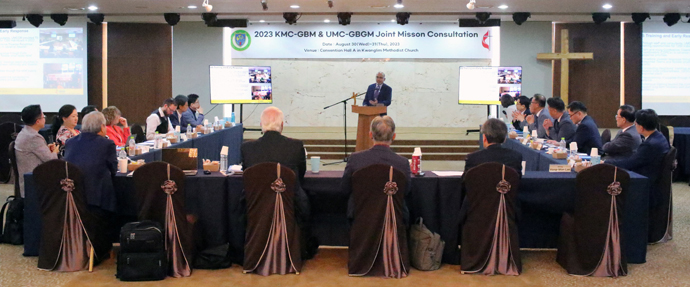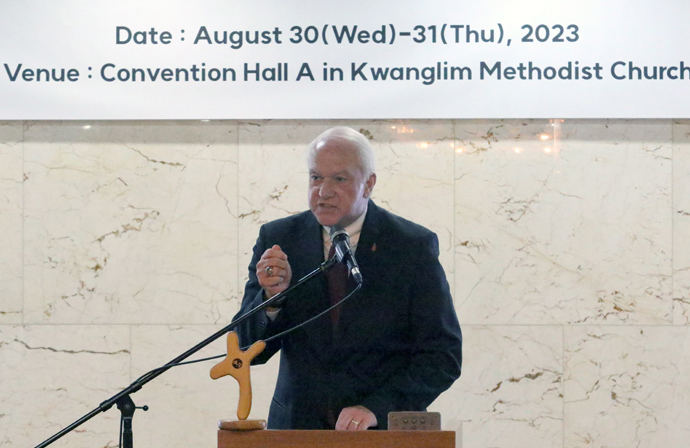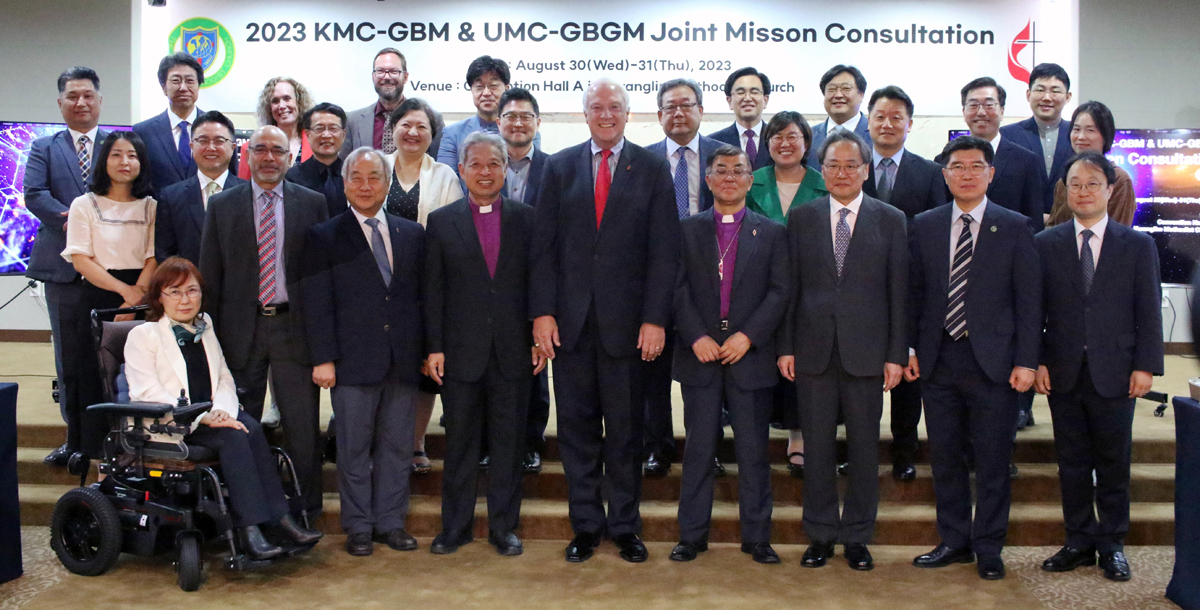Key points:
- The General Board of Missions of the Korean Methodist Church and the United Methodist Board of Global Ministries held their second Mission Consultation Aug. 30-31 at Kwanglim Methodist Church in Seoul.
- Bishop Thomas Bickerton, Council of Bishops president, said that The United Methodist Church aims to move toward regionalization that respects different theological understandings and allows for diversity.
- The two groups agreed to collaborate on developing faith leaders in Asia and collaborating on ministries for peace and justice on the Korean Peninsula and worldwide.
The General Board of Missions of the Korean Methodist Church and the United Methodist Board of Global Ministries held their second Mission Consultation Aug. 30-31 at Kwanglim Methodist Church in Seoul. The first Mission Consultation met in August 2022 in Atlanta.
Participants from The United Methodist Church included Bishop Thomas Bickerton, president of the Council of Bishops; Bishop Hee-soo Jung, president of the Board of Global Ministries; Bishop Sally Dyck, ecumenical officer of the Council of Bishops; and Roland Fernandes, top executive of the Board of Global Ministries.

From the Korean Methodist Church, attendees included Bishop Chul Lee, President Bishop of the Korean Methodist Church; Bishop Chungsuk Kim, former president of the General Board of Missions; and Bishop Yong-Won Lee, president of the General Board of Missions. They were joined by mission-related persons from both denominations.
At the opening worship service, Bishop Yong-Won Lee expressed gratitude for the dedication and sacrifices of 600 United Methodist missionaries to Korea who have been an invaluable source of nourishment for the Korean church. He urged the two denominations to work together to overcome the missional crisis in Asia.
The Rev. Dong-Hwa Tae, general secretary of the General Board of Missions of the Korean Methodist Church, discussed the birth and growth of the Korean church after an American Methodist missionary, Henry Appenzeller, came to Korea in 1885. He reported that as of 2010, the Korean Methodist Church has 6,077 churches; 9,422 pastors and 1,587,385 members.
“In addition, the church has grown to contribute to developing human rights and democracy by actively engaging in social issues, and to Korean society in personal holiness and social salvation,” he said.
Tae also shared some challenges and issues that the Korean church faces. He reported that, after peaking in 2010, church growth has trended down — especially in the past three years during the COVID-19 pandemic.
“The hottest issues in the Korean churches are homosexuality and anti-discrimination laws. We seek to answer these issues from a biblical perspective and in the tradition of the church, and to find the wisdom to help communities to lovingly be united in faith of confessing Jesus Christ as Lord,” he said.
Roland Fernandes, top executive of the United Methodist Board of Global Ministries, said that the 2022 meeting took the relationship between the two groups to a new level, adding that this Mission Consultation would be an important opportunity to strengthen their cooperation and solidarity. He proposed the creation of a working group to implement what was discussed.
Subscribe to our
e-newsletter
Fernandes cited two goals: to develop a strategic plan for ongoing mission initiatives in the six countries in Asia, and to pursue peace and justice.
“There is a need for a much stronger agenda to counter the rise of racism, nationalism and violent politics,” he said. “We look forward to working with the KMC to advocate for peace on the Korean Peninsula.”
He also lifted up the work of the United Methodist Committee on Relief and reported that the committee had raised $28 million specifically for war-torn Ukraine.
The Rev. Judy Chung, executive director of Missionary Service at Global Ministries, introduced the Global Mission Fellows program, which provides opportunities for young adults to develop and demonstrate leadership in addition to mission work over two years.
“Since 1951, the General Board of Global Ministries of The United Methodist Church has provided mission opportunities for young people to make disciples to transform the world with faith and justice for the past 70 years,” she said. “I look forward to working with the KMC in this program."
David Scott, director of Mission Theology at Global Ministries, explained the meaning of mission initiatives in a presentation titled “Cooperation in Local Leadership Formation in Asia.” Their primary focus, he said, is on helping areas of The United Methodist Church develop Methodism in countries where it did not previously exist.
“Mission Initiatives may include work in education, health, social services, agriculture, and/or other areas, but the primary purpose is evangelistic, and these other forms of work exist to support the evangelistic focus of the Mission Initiative,” he said.
Bishop Hee-soo Jung emphasized the close relationship between the Korean church in the U.S. and The United Methodist Church, and remarked on the care given to the Korean church by The United Methodist Church and the contributions of Korean American United Methodist clergy to the denomination.
“There are nearly 1,000 Korean American pastors serving congregations and boards and agencies in the UMC — a rare example in the history of the church,” he said. “They are committed to God's mission and are well-trained theologically. Let's absorb some of that healthy Methodist DNA and work together.”

The Rev. Paul H. Chang, executive director of the Korean Ministry Plan, reported on the current status of Korean United Methodist churches. He identified 280 congregations, including 244 Korean-language congregations, 36 English-language congregations and those not yet officially chartered. He said there are a total of 900 active Korean United Methodist clergy.
Chang expects the number of churches that leave the denomination to increase.
“About 40 congregations are expected to leave, representing 15 to 17% of the 280 Korean congregations, and about 60 pastors are expected to leave,” he said.
Bishop Thomas Bickerton was asked about the disaffiliation status of The United Methodist Church. He said the expectation is that about 30% of the churches will leave the denomination. Of those that leave, he said, half will likely join the Global Methodist Church and half will remain independent.
“We are working to renew the church in the context of disaffiliation,” he said.
Bickerton then shared his reflections on the regionalization of The United Methodist Church and the mission approaches of the past.
He explained that The United Methodist Church’s geopolitical mix of four continents — the United States, Africa, the Philippines and Europe — with different theological diversities is both a gift and a challenge. Bickerton said that the church reflects on past missions and tries to move toward regionalization that respects different theological understandings and allows for diversity.
“We thought it was best for American members to tell members in other continents how to live and maintain their churches. That was imperialistic and colonialistic,” he said. “There is a petition for regionalization for the upcoming General Conference that gives each continent its autonomy and does not impose American norms.”
He added that the church cannot impose certain theological positions on other parts of the world, including human sexuality.
“To impose certain theological positions would be sin,” he said. “We want to understand and resolve tensions among continents through regionalization. We want to learn more and more from other continents, and we want to respect them and give up imposing our ideas.”
The two groups agreed on the following areas to collaborate in mission in Asia:
- Collaborate to train and develop local leaders in Asia, especially Mongolia and Vietnam,
- Develop youth and women's leadership in Asia, and
- Collaborate on ministries for peace and justice on the Korean Peninsula and worldwide.
After the mission consultation, the responses and attention from the Korean Methodist Church were focused more on Bickerton’s remarks and explanation of regionalization than the agreements between the denominations.
Bishop Chul Lee said to UM News that he highly valued Bickerton’s remarks and that many of his previous concerns had been resolved, adding that even though the Korean Methodist Church is not part of the denomination, The United Methodist Church's stance on human sexuality has a lot of influence on them.
“Our concerns were resolved after we were told that The United Methodist Church is promoting regionalization to accept and respect different theological understandings of each continent and allows for its diversities, not decision by a majority of white people in the United States and not with a ‘follow us’ attitude,” he said.
“I think it's a great declaration that they said they're not going to dominate others' thinking, and that they're not going to consider their ideas superior to others. And they said that's sinful.”
The Rev. Hong-Geun You, executive secretary of the Board of Mission and Society of the Korean Methodist Church, also expressed deep appreciation for Bickerton's reflection and remarks on the past mission policies.
“When we were preparing for the Roundtable for Peace on the Korean Peninsula, we were going to ask for the historical perspective of The United Methodist Church, but we thought that it was too much, so we didn't raise it,” he said. “I was surprised that Bishop Bickerton … brought it up first and confessed that it was their sin.
“I was even more surprised again when Bishop Bickerton said it was overdue.”
Kim is director of Korean and Asian news at United Methodist Communications. Contact him at 615-742-5470 or [email protected]. To read more United Methodist news, subscribe to the free Daily or Weekly Digests.




